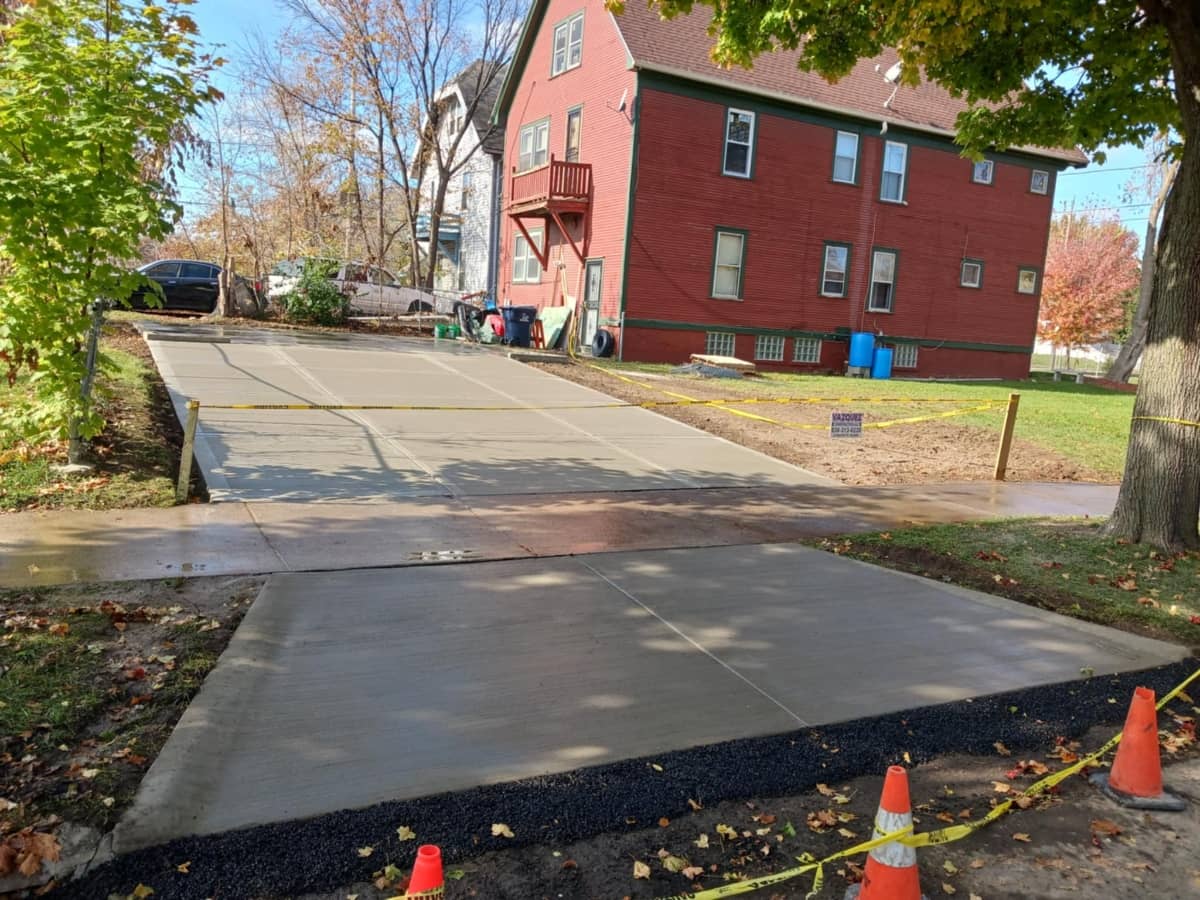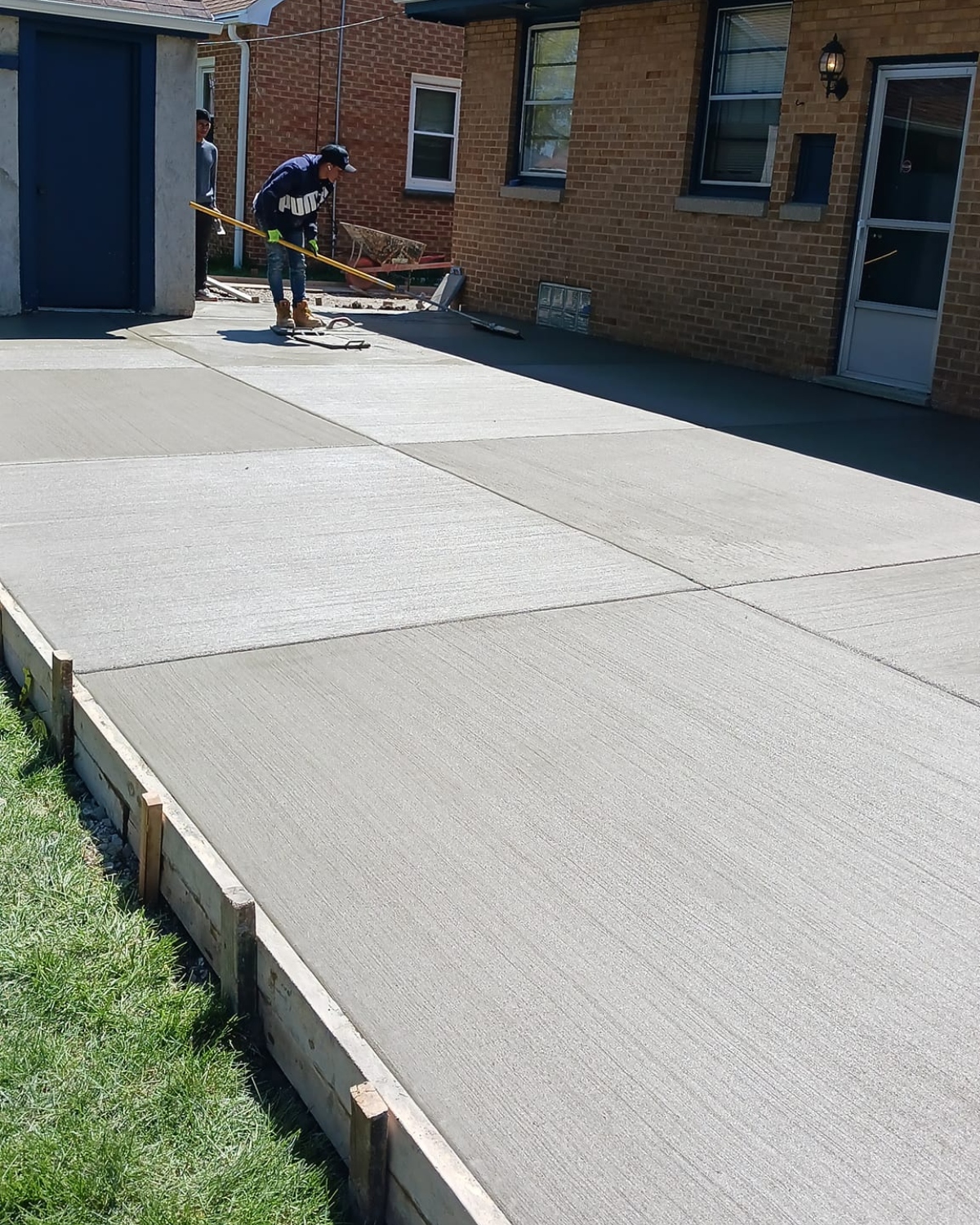Concrete is one of the most popular driveway materials, as it gives your property a clean and long-lasting appearance. Investing in a concrete driveway is a cost-effective and low-maintenance option, and can improve your home’s curb appeal.
Concrete is made of materials, like rock, sand, water, and cement. With proper preparations and high-quality installation, they can last a very long time.
A concrete driveway can withstand a range of weather influences, and with minimal maintenance, a reliable concrete driveway can last between 25 and 30 years.
When installed correctly, concrete driveways are safe and comfortable for driving. The even, sleek surface offers a solid foundation for use, reducing vehicle damage that can occur on rough surfaces.
It’s easy to maintain a concrete driveway once you understand the conditions that impact its soundness and performance, and by following a few simple maintenance guidelines.
What Affects the Lifespan of Your Concrete Driveway?
A new concrete driveway can last up to 30 years, but it’s essential to start with the right materials and a proper installation. Experienced concrete contractors like Vazquez Construction LLC can make the process seem effortless, as they prep for success by adequately grading the site and designing for correct drainage.
For your driveway to last, it should be constructed with the proper mix of concrete for the climate and soil conditions of your specific area. If you live in Milwaukee or other parts of Wisconsin, like most of our clients, you’ll want material with a high PSI rating that can handle the cold weather.
The natural elements can affect the construction, so harsh climatic conditions such as heavy snowfall, freezing and thawing, rain, and temperature variances can influence the longevity of your concrete.
Once the concrete driveway is installed, you’ll need to pay some attention to ensure it has a long, healthy life. Fortunately, there isn’t too much maintenance required, but you should keep your driveway clear of dirt and debris and give it a water rinse frequently. The better care you give your concrete driveway, the longer it can last.
These driveways can withstand a lot of abuse since they’re robust and stable, but the more wear and tear your driveway endures, the sooner it can erode. If your driveway is subject to constant heavy vehicle and equipment use, its lifespan can be shortened, or require more repairs.
Concrete Driveway Maintenance Tips

You can extend the life of your concrete driveway by keeping it free from dirt, debris, and standing water. Concrete is quite strong, but it’s also porous, so keeping it clean minimizes staining and damage.
Sweep the driveway regularly with a broom and rinse it down with water. After de-greasing oil spots, use a power washer for maximum effectiveness. Avoid using chemical cleaning agents, as they can corrode the concrete surface and make it susceptible to discoloration and cracks.
If you seal your driveway every 2-3 years, you can avoid many of the problems that develop from excess moisture, stains, and weather. While you can take a DIY approach, a professional contractor with experience will know the best sealant to use for your driveway.
Sealing the concrete driveway occasionally can also shield it from deterioration if you live in an area that sees heavy storms and flooding. Moisture build-up will eventually damage the material, so sealing is an effective way to protect it.
Homeowners living in areas that experience heavy snows can benefit from installing a smooth driveway, as it’s easier to shovel and snow-blow. Always use the right tools for the job and avoid scratching or gouging the concrete, which can lead to future cracks and fissures.
You should also avoid using deicing salts to dissolve snow that accumulates on the surface. The resulting slushy, briny material can seep into the concrete and weaken it, especially if it’s unsealed or needs resealing.
Keep to a seasonal cleaning schedule for your driveway. Inspect for new cracks and repair them quickly, sweep and power wash often, check for drainage issues, and clean and remove gasoline, oil, and other stains when they first appear.
Signs You Need To Replace Your Concrete Driveway
Over time, you might notice signs of wear and tear that make you wonder if you need to install new material or repair it. The good news is that when small defects appear, you can have them repaired for continued use.
There are, however, some types of damage that are serious enough to ruin your concrete driveway’s functionality. When these occur, it’s time to replace all of it.
Hairline cracks that don’t exceed 1/8-inch can usually be repaired, but when large, wide cracks crop up, you might be better off getting an entire replacement.
In addition to cracks, chips, crumbling, or pitting (known as spalling) can develop. A professional can evaluate whether it makes more sense to repair or install a new concrete slab.
When the driveway starts to sink, buckle, or settle, it’s time to call in a concrete contractor to gauge the extent of the damage. Severe sinking can be dangerous for continued use and can also result in further cracking and spalling.
Reach out to us if you want a long-lasting driveway installed to replace your existing one.
